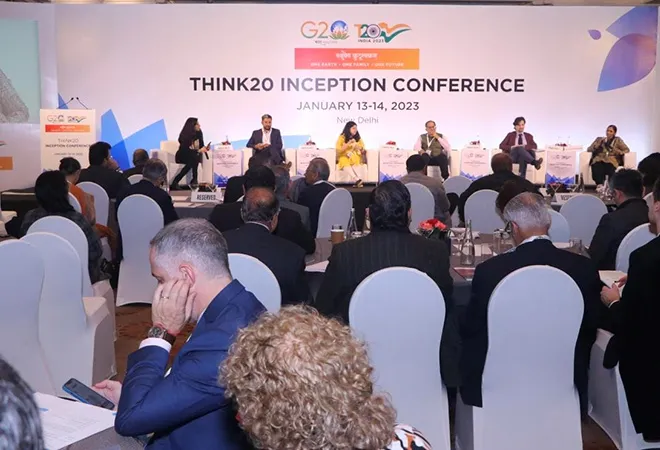Speakers:
- Pencho Kuzev, Policy Advisor, KAS, Germany
- Sharad Sharma, Co-Founder, iSPIRT, India
- Ramiro Albrieu, Associate Professor, Macroeconomics and Finance; Senior Researcher University of Beunos Aires; CIPPEC, Argentina
- Shambhavi Naik, Head of Research, Takshashila Institution, India
- Kalpana Sastry Regulagedda, Managing Director, Ag-Hub, India
- Chair: Urvashi Aneja, Founding Director, Digital Futures Lab, India
Digitalisation and the Sustainable Development Goals (SDGs) are inextricably interconnected. Inclusive, equitable digitalisation is critical for the achievement of SDGs. As the prompt to speakers stated, “Technology is the foundation for sustainable and inclusive economic growth, employment and decent work.” At the same time, the process of digitalisation itself must serve the public good, and must weave in principles of trust, responsibility, inclusion, and transparency into the development, deployment, and use of technologies. Lying at the intersection of two taskforces of the Think20, this panel
, Beyond the Banter: Inclusive Digital Infrastructure and Agenda 2030, sought to break the silos between innovation and digital public infrastructure on the one hand, and sustainable development on the other.
At the outset, it is crucial to define the object of discussion. What is digital public infrastructure (DPI)? Some experts
define it as “digital solutions that enable basic functions essential for public and private service delivery, i.e. collaboration, commerce, and governance.” The Digital Public Good Alliance similarly
states that DPI, “
efers to solutions and systems that enable the effective provision of essential society-wide functions and services in the public and private sectors. This includes but is not limited to digital forms of ID and verification, civil registration, payment (digital transactions and money transfers), data exchange, and information systems.” Sharad Sharma, Co-Founder, iSPIRT, defined it more expansively as infrastructure that “mediates the flow of people, information, and money.” All panellists agreed that the only way to deploy and regulate DPIs is a close partnership between government and the private sector, although the contours of this cooperation can take on multifarious forms depending on the digital ecosystem of a country.
DPIs can be foundational, such as digital IDs, or sector specific. Shambhavi Naik, Head of Research, Takshashila Institution, and Kalpana Sastry Regulagedda, Managing Director, Ag-Hub, both identified several priority use cases for a developing country context, such as primary care, distribution of benefits, and sustainable agriculture.
The Think20 is unique among the G20 workstreams as it functions as the ideas bank of the G20. In a space as amorphous as DPIs, the Think20 is thus a space to define the contours of DPIs, guiding principles for entire DPI lifecycle, including development, collaboration, financing, and use. Regulagedda, for instance, identified five principles—Precision, Predictability, Productivity, Prosperity, Profitability—for guiding the development of digital tools. Naik proposed keeping three animating ideas—public welfare, equitable distribution, and purpose limitation—when looking at governing DPIs.
A common theme, likely due to how it undergirds DPIs, was data: How and crucially, where it is housed, as well as how it is shared. Pencho Kuzev, Policy Advisor, KAS, focused his intervention on open data, noting that it is crucial to digital transformation and that is where data policy and competition policy are at loggerheads. He highlighted how there needs to be alignment within the G20 on open data standards and privacy, while presenting the caveat that dependencies on digital multinationals have presented challenges, including for sustainable development. Sharad Sharma, echoing developing country concerns, also emphasised the challenges of dependency and digital monopolies. Sharma pointed to two concurrent phenomena: First, digital colonisation, where developing countries become data suppliers and service consumers to large tech conglomerates; and second, the rising threat of digital authoritarianism, which he defined as the spread of digital technology built in and serving the interests of authoritarian regimes like China.
Indeed, as Urvashi Aneja, Founding Director, Digital Futures Lab, noted in her framing of the conversation, “the existing model of tech-led growth is broken, with international institutions dominated by a handful of actors from powerful economies.” Changing tracks, Regulagedda focused her analysis on data sharing within nations, to harness existing datasets. Specifically, she highlighted how a data sharing framework to harness decades of agriculture and nutrition data housed in the public sector is needed for entrepreneurs to effectively address SDG challenges. Ramiro Albrieu, Senior Researcher University of Buenos Aires, echoed this sentiment with a broader statement on how the race to digitalise is being governed by rapid datafication and automation. “We need,” Albrieu declared, “to forge a new social contract to define priorities of public-private partnerships.”
As the Think20 embarks on an ambitious agenda for 2023, the panellists shared their hopes for India’s Presidency during this pivotal moment for DPIs. Naik reminded the audience that DPI is “a means to an end, and unless we understand and back these ends, DPI will not be effective.” Regulagedda urged innovators to be creative and hyperlocal in how they deploy solutions. Sharma cautioned that there is no single template for DPI; not everything that worked for a given group in a certain context will work for everyone. Finally, with three successive Global South presidencies, Indonesia in 2022, India in 2023, and Brazil in 2024, Albrieu celebrated the fact that the G20 and Think20 are a unique forum for peer learning and balanced discussion, and a space for Global South voices to be heard.
Watch the full session here.
This report was compiled by Trisha Ray, Deputy Director, CSST, ORF.
The views expressed above belong to the author(s). ORF research and analyses now available on Telegram! Click here to access our curated content — blogs, longforms and interviews.
